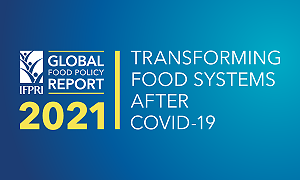Agricultural lands are vital to food security, which is imperative to the “no global hunger” objective of the United Nation’s Sustainable Development Goals.
Search
Public expenditure’s role in reducing poverty and improving food and nutrition security: Preliminary cross-country insights based on SPEED data
Public expenditures (PE), their sizes, and allocations across sectors, are some of the important instruments for the public sector to contribute toward sustainable development goals (SDGs).
In 2020, PIM findings contributed to seed policies in Nepal and Uganda, Malawi’s extension strategy and approval of insect-resistant cotton, a nationwide program aimed at improving the effectiveness of public service delivery in Uganda, social pro
Addressing hidden hunger with nutrient-dense staple crops—developed through the process of biofortification—has gained considerable traction in low- and middle-income countries since the first varieties were released to farmers 16 years ago.
Pre-pandemic, 3 billion people could not afford a healthy diet; that number could rise by 267.6 million due to the pandemic. Food system transformation must support healthy diets and tackle all forms of malnutrition.
2021 Global food policy report: Transforming food systems after COVID-19: Synopsis [in Chinese]
2020年在诸多方面都让我们始料未及。新冠肺炎(COVID-19)疫情为全球带来了一场大规模的公共卫生灾难,各国均陷入了疫情及其相关应对政策带来的不同程度的经济困境,面临服务严重中断和人员流动严重受限的局面。无论是富裕国家还是贫穷国家,均未能幸免。在中低收入国家,许多弱势群体直接面临食物安全、医疗和营养方面的威胁。丧失生计、营养不良、教育中断和资源枯竭造成的长期影响可能性非常巨大,特别是对许多国家来说,距离新冠肺炎疫情的结束还遥遥无期。
Private sector enterprises all along food supply chains must play a central role in food system resilience and transformation; the pandemic revealed some of the sector’s weaknesses and strengths that can help to build greater resilience.
The coronavirus pandemic has upended local, national, and global food systems, and put the Sustainable Development Goals further out of reach. But lessons from the world’s response can help address future shocks and contribute to change.
Food systems need to be transformed if we are to meet the Sustainable Development Goals and increase resilience of these systems to shocks. The pandemic has provided useful lessons on opportunities and weaknesses that must be addressed.
The coronavirus pandemic has upended local, national, and global food systems, and put the Sustainable Development Goals further out of reach. But lessons from the world’s response can help address future shocks and contribute to change.
Toward inclusive food systems: Pandemics, vulnerable groups, and the role of social protection
Vulnerable groups have been most affected by disruption to food systems, such as lockdowns, through loss of employment and incomes. Social protection has a key role to play in times of health and economic shocks.
Rethinking food system policies in terms of “eco-agro-food systems” can help to foster an integrated approach that will maintain and restore vital ecosystem services and reduce the likelihood of future shocks.
2021 Global food policy report: Transforming food systems after COVID-19: Synopsis [in Arabic]
Abstract Text Here
2021 Global food policy report: Transforming food systems after COVID-19: Synopsis [in Russian]
2020 год был во многом беспрецедентным.
L’année 2020 a été une période inédite à bien des égards.
Policymakers must balance critical trade-offs among policy actions and spending priorities for health, food systems, and economies. This requires a multisectoral perspective and clearly defined values.
El año 2020 fue un año sin precedentes en muchos sentidos.
Today, agrifood systems are undergoing remarkable changes, reflected in the modernization of food value chains and rural transformation responding to urbanization, income growth, and expansion of international trade.
Impacts of COVID-19 on Myanmar’s poultry sector: Implications for achieving the sustainable development goals
This paper analyzes the impact of COVID-19 on two types of poultry production systems, broilers and layers, in Myanmar using five waves of telephone surveys from June to August 2020.
Mozambique is a signatory to the Comprehensive Africa Agriculture Development Programme (CAADP) and the 2014 Malabo Declaration on Accelerated Growth and Transformation for Shared Prosperity and Improved Livelihoods that commit the country to achi


